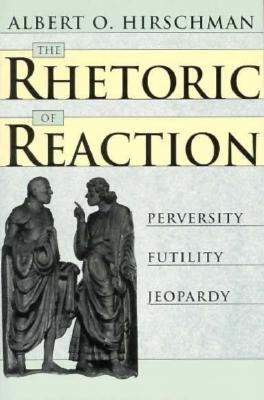American liberals have long been troubled by a sinister force lurking in our society, namely conservatism. Albert O. Hirschman’s motive in writing The Rhetoric of Reaction is to explain this phenomenon to his fellow liberals. He refrains from psychoanalyzing conservatism; instead, he argues that conservatives, regardless of personal quirks, are bound to certain forms of argument. Hirschman seeks to analyze those forms, not the contents of contemporary conservative argument. In doing so, he comes off as an old-fashioned liberal and seems to regard as one of the prime differences between right and left the latter’s supposedly greater faith in humanity.
Following the lead of British sociologist T.H. Marshall, Hirschman suggests that citizenship in Western societies has developed in three stages. The first of these was the development of civil rights (e.g., freedom of speech and of religion and equality before the law), which he associates with the Enlightenment and the French Revolution. The second was the development of full-scale political democracy and universal suffrage. Finally, the concept of rights was extended to include social and economic rights in the 20th-century welfare state, which, as far as American society is concerned, he identifies with the Great Society reforms. Each of these three stages of triumph elicited a bitter reaction aimed at undoing its progress, and in countering all three phases conservatives or reactionaries developed three brands of argument (Hirschman is awfully fond of triplets). First is the “perversity thesis,” which he rightly deems the strongest weapon in the arsenal of the right, and which suggests that a proposed reform will actually hurt the group it is supposed to help. Burke’s philippics against the French revolutionaries are a classic case, while Charles Murray’s Losing Ground is the outstanding contemporary example of the perversity argument in the present day. The “futility thesis” argues that basic social laws will prevent a reform from succeeding or insure that it will actually aid some group that is already well off. The arguments of Mosca and Pareto that universal suffrage would actually strengthen the grip of the old upper classes in Italy and present-day suggestions that welfare-state measures really channel money to elements of the middle class are examples of the futility argument. Hirschman argues, not entirely convincingly, that the perversity and futility theses are contradictory.
Third, and perhaps least impressive, is the “jeopardy thesis,” which holds that some present proposed reform will undermine some previous progressive achievement. Arguments against the extension of the suffrage in the 19th century on the ground that democracy would destroy liberty, and those made today against the welfare state on the ground that it will destroy democracy, are examples of the jeopardy thesis. To Hirschman, the fact that earlier charges of perversity, futility, and jeopardy were false (or seem so to him) suggests that the present-day “versions” are also false or at least wildly exaggerated—although one can occasionally glimpse, in this book, a hint of admiration for the sneaky right-wingers who conjure them up.
Some of Hirschman’s arguments are simplifications, while others, being more complex, are difficult to follow. Nor is it quite clear that “perversity” and “futility” theses are mutually exclusive, as far as the modern welfare state is concerned. Hirschman argues that the perversity effect, so well described by Charles Murray, requires that transfer payments actually reach the poor to derange their vital decisions, while the futility effect asserts that they go somewhere else. I am not so sure, however, that these arguments are really contradictory in practice. No one would suggest that transfer payments are big enough to lift the poor into the middle class; after welfare, Harlem is still Harlem, not Rego Park, much less Park Avenue. The enormously expensive welfare machine does, in fact, divert much money into the hands of its middle-class administrators. Moreover—and here we find futility with a vengeance—it does not seem to reach the very worst off, as witness the people roaming the streets of our cities.
That the mere extension of bureaucratic authority is likely to erode both traditional civil rights and the effectiveness of democracy eludes Hirschman. In fairness, however, it should be stressed that he does not assail rightwing illusions only. There are, he notes, roughly parallel arguments on the left; although “progressives” like to suppose that liberty, democracy, and social reforms are neatly compatible, this is not, Hirschman admits, invariably the case. He also discusses the left’s counterpart of the jeopardy thesis, the “imminent danger” argument—that reform is the sole way to avoid imminent disaster. That, of course, is sometimes true. The rueful contemplation of Chiang Kai-shek in exile on Taiwan, of his failure to institute land reform on the mainland, testifies to a fine example of “imminent danger” ignored. In fact, both “progressive” and “reactionary” theses have foundations in reality, although not necessarily to an equal extent. Hirschman insists that over the years the right has made many silly predictions concerning the inevitable results of liberal ideas. The chief problem is that the left has usually managed to live down to them.
[The Rhetoric of Reaction, by Albert O. Hirschman (Cambridge, Massachusetts: The Belknap Press) 197 pp., $25.00]

Leave a Reply